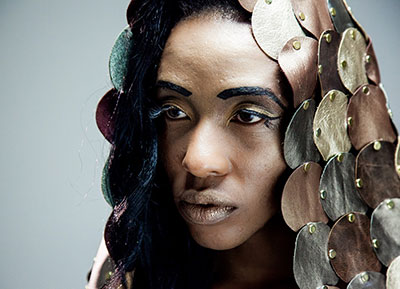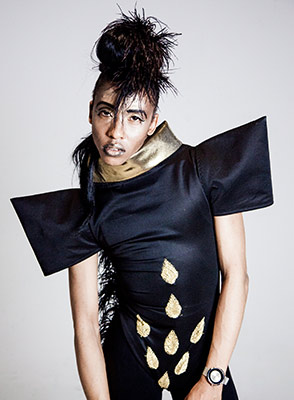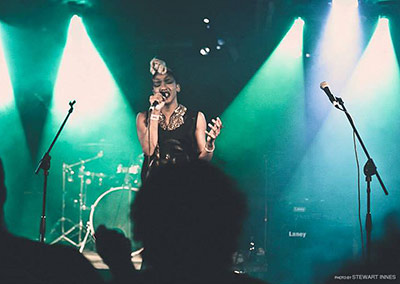PUSHING BUTTONS: UMLILO

Pic: Mads Norgaad
Cape Town performer and producer Umlilo is making waves in the music world – not only for his electro soundscapes but also for his gender-busting imagery and unique sense of style.
On a continent that remains distinctly conservative when it comes to sexuality and gender identity, he’s pushing buttons and having a blast doing it.
The first single Living Dangerously off his debut EP Shades of Kwaai was named one of Rolling Stone SA magazine’s hottest singles of the month for May 2013 and he’s since been playlisted around the world.
And it’s not just music. Umlilo is a multi-disciplinary artist; he’s been involved in film, TV, art, theatre and music. He scored and directed the documentary His Husband about Aids Activist Zackie Achmat and recently scored Genna Gardini’s award winning play Scrape.
He also performs regularly at Upstairs at the Alexander Bar, and at other parties and events (like MCQP), and hosts “extravaganza art balls” at unconventional art spaces around Cape Town.
His standout track Out of My Face and its music video caught our attention, and we knew we had to get to know more about this multi-talented artist.
Umlilo, how would you describe your music?
Future kwaai. It’s a mix of everything I am and aspire to be musically.
Your musical influences?
Everyone from Brenda Fassie, Miriam Makeba, Ru Paul, Aaliyah, Mbongeni Ngema to Michael Jackson and Prince. I loved the Spice Girls but I also loved Trompies and Alanis Morrisette and even Outkast so it’s all in me; all those influences are in there somewhere.
You’ve previously also mentioned Die Antwoord…
When they first came out, I was very excited. They sent an electric pulse across the web space, they dominated the world and embraced the weird, the macabre and exposed the less celebrated parts of our country, image and languages. Perhaps it got a little too weird, exploitative and disjointed? I don’t know anymore.
You identify as a queer artist. To what extent does that play a role in your work?
To me, being queer is something as incidental as being black or being a certain height and I don’t ever get labelled as “a black artist’ but at the same time I do realise the importance of these labels in the current state of the world. The way I present my work is completely true to who I am and however eclectic or complex that is. While being queer is not central or essential to my work, it’s part of the conversation I’d like to interrogate through my music, image and performances. For me the most important thing is to speak my truth and reality the best way I can and hopefully someone out there can relate.
Other artists choose to downplay their sexuality or non-conventional gender identity – you haven’t.
I’ve been one of the lucky few who’ve been able to embrace and love who I am from a very young age so I’ve had a lot of practise in being comfortable in my own skin. Studying performance at Rhodes and also living in Cape Town also helped break my personal barriers and to strive to be unique and use those complexities within myself as strengths rather than things to be ashamed of. Ignoring my sexuality would be like ignoring the big elephant in the room so why not bring the elephant to the forefront and play around with ideas around it? It’s way more fun to play with people’s perceptions about gender and sexuality than be in a personal prison. Being free of mind and body also helps free your artistic expression.
The styling, fashion and imagery in the Out of My Face video are awesome.
Style and fashion is an essential part of what I do. I like pretty things and I like playing dress up. Fashion sometimes helps you express exactly what you want to say creatively and if anything, it makes you feel good, so why deny yourself of it?
Did you make a conscious choice to challenge gender conventions in your videos?
No, it wasn’t conscious at all. Many won’t believe me but the way I present myself in my music, videos and stage performances is pretty much the way I am every day; maybe with a little less glitter and glam but that’s just me. I wear my heart on my sleeve quite literally. I never fitted into strict gender norms even within the LGBTI community and definitely not in the music industry so I decided ‘fuck it!’ I’m just going to wear what I want, sing the way I sing and just do me. It’s too exhausting to try to fit into a certain mould when you really don’t fit in so why try? You’re only pleasing someone else and Ru Paul once said “You’re born naked and the rest is drag”. That has always stuck with me. We all play a game of drag every morning when we decide what to wear, whether we’re conscious of it or not. Everyone is a drag queen.

Pic: Mads Norgaad
Have you received any backlash against that?
Yeah, I’ve had a few haters here and there but for the most part, there’s been so much support and love from people. I think we all need those people who challenge us because they’re just as important as the ones who support us; they keep us on our toes and remind us exactly what we’re fighting for.
As an African artist, do you think it’s more of a challenge to what you do than your counterparts in Europe or the US?
Being African is challenging enough, and then add being a black, queer artist and you have a mammoth task. I think I’m very lucky to be in Cape Town, South Africa and be able to do what I do. Let’s face it, so many of our queer brothers and sisters don’t have the same privilege. I’m always aware of that but I don’t think it would necessarily be easier in Europe of the US because homophobes, racists, sexists, bigots, religious extremists and general haters exist all over the world.
What do you think about the recent wave of homophobia in Africa?
I think it worries a lot of us. Africa is a continent that has gone through grave hurt and oppression and some countries are trying to heal while others are recycling the same hurt and oppression that was done to them. How did homosexuality become the number one item of the agenda in Uganda and Nigeria when people need food and shelter and other basic needs?
We’re seeing so many of our own getting lynched exactly the way Africans were lynched during slavery and apartheid and civil war, for what? Not the colour of our skin but for who we love. It’s not homosexuality that was a western import, its homophobia. We’re seeing American evangelists using the Bible – the biggest import from the West – yet again to oppress people and push their own agendas in impoverished African countries. And I think because of centuries of oppression, some African people still feel so insecure and inferior in their own skin that they have to take out that frustration onto others. The way history repeats itself shocks me but I know we have to fight for the right to live and maybe it’s time we looked at our own African customs and ideas like ubuntu rather than rehashing the old testament.
How should artists and performers respond to the situation?
We need more art that actually speaks about or interrogates our current state. That’s why I admire artists like Steven Cohen and Zanele Muholi. If each of us responded within our respective art forms, we are raising awareness. But awareness is not enough. We need to boycott those countries and refuse to perform there like artists did during apartheid. We cannot tolerate this kind of human injustice. It starts with awareness and then banding together to make a stand.

Is Cape Town a good place to be doing what you do?
It’s a very crazy city with lots of diverse people and cultures so it’s always a melting pot for art. We have such great international traffic and so many visual and sonic pleasures, it’s always inspiring.
At the same time though, there’s such a gap in class and race. There’s not a lot of development in the music business and those things pose challenges – but I like how bipolar the city is. Most of my friends and conspirators live here so that kind of support system is great for my music.
You’ve worked in a lot of creative arenas. Was that a conscious choice?
It just happened I guess. I’m a curious cat by nature and when I was younger I always wanted to be involved in a creative field so I studied a whole lot of different things like theatre, TV and media and realised that I was good at them so I kept going and discovering which other avenues I could be involved in. Film, fashion, theatre, TV and music are all interlinked. In the creative fields, you have to adapt or die and being multidisciplinary person is key to having a successful future because you’re constantly challenging yourself and learning new things.
You’re a producer and a performer…
I see myself as a performer first then as a producer. Production was a means to an end when I began learning about it. There was no one else to make music for me so I had to make my own music with the end goal of performing it to people. The stage is like a drug and it can easily get addictive so what can is say? I’m hooked.
What’s next for Umlilo?
I’m working on my next EP as well as focusing on my live performances. We’re going to be launching The Umlilo Kwaai Balls, and perhaps an international tour. I have recorded some new singles with Naas Music, which will be coming out soon. It’s busy busy busy…
You can download Umlilo’s free Shades of Kwaai EP here or here. Like him on Facebook or follow him on Twitter.
Leave a Reply